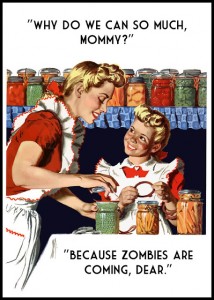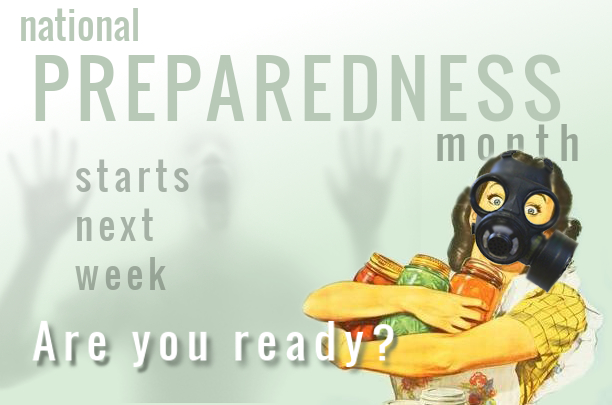by Fr. John A. Peck
National Preparedness Month is almost upon us, and in light of that, I thought a quick look at why being prepared makes sense, and can, in fact, be a fun activity for yourself and your family. Why should you do it at all?
Let’s quickly review a few things we’ve seen in the past few months.
- Extreme Drought is crushing not only California, but a great deal of the west and south, resulting is smaller herds of livestock;
- The Ebola Outbreak threatens to appear almost anywhere; flu Season is almost upon us and Ebola symptoms are identical to flu symptoms in the early stages;
- Islamists, who have organization, training and funding, are preparing to destroy an American city;
- The worst nuclear disaster in human history is an ongoing problem with ongoing danger;
- Illegal aliens continue to flood over our borders, bringing massive need, disease, gang members, felons, and foreign nationals who are anything but friendly to America;
- Pig farms are being laid to waste by a new and deadly pig epidemic;
- Colony Collapse Disorder continues in bee populations;
- Food prices are soaring;
- Communities explode in civil unrest at seemingly a moment’s notice, and face an increasingly militarized police force;
- War threatens our allies and we have troops in harms way already;
- Floods inundated parts of Arizona only last week! Did I mention Hurricane season is coming?
Believe me, I could easily go on. Being prepared is not just a Boy Scout motto, but an American way of life. The CDC wants you to be ready for a Zombie Apocalypse (the idea being, if you are prepared for a Zombie Apocalypse, you’re prepared for anything). For the person who believes you have never done any ‘preparing’ – you actually have!
When you go to the store before a storm to pick up a few extras, when you buy to keep yourself going until the next paycheck, when you just have a little extra medicine, in case of an emergency, you’ve been preparing. It does not require a complete change of life, buying bunkers, gas masks and exotic items for survival. For most folks, it means having more than three days worth of necessities. If you have three days, work on three weeks. If you have three weeks, work on three months. It’s not as hard as you think.
This episode of “Surviving Disaster” describes in simple detail what it actually takes to survive three months at home. Enjoy the show, and take a few notes.
The IOCC Preparedness Recommendations
For years now, the IOCC (International Orthodox Christian Charities) has recommended that Americans, wherever they live, should make preparations for unexpected natural disasters or serious civil problems, such as terrorist attacks, which can make getting supplies almost impossible. By preparing yourself, no matter where you are, you take the burden off of emergency responders to get to folks who need help – who did not prepare.
Here is the link to the IOCC Preparedness Emergency Kit Flyer. I recommend you download it and get to work!
According to the 2009 Citizen Corps National Survey, only 36 percent of individuals believed there was a high likelihood of a natural disaster to EVER happen in their community. Many people think they have everything they need in the event of an emergency at hand, and can simply “grab and go.” It’s called a 72 hour bag, but goes by many other names (i.e., BOB – Bug Out Bag).
Your Family’s First Responder
You are your family’s first responder, and in many ways you are your neighbor’s first responder. All of us as participants in our communities and members of our families need to take concrete steps to proactively prepare for emergencies and disasters. Local, state, and national authorities are going to help, but they may not be able to get to you right away.
We all need to be prepared for those first 72 hours before help can reach us.
September is the perfect time to take action and get your family Ready. Readiness comes in many forms and preparedness is everyone’s responsibility. We have to work together, as a team, to ensure that our families, neighborhoods, and communities are Ready.
- Get an emergency supply kit.
- Make a family emergency plan.
- Be informed about the risks in your area.
- Work with your neighbor and know who might need just a little extra help.
To help get your family started, Ready Kids is a family-friendly, children-oriented tool to help parents and teachers educate children, ages 8-12, about emergencies and how they can help families better prepare. The Ready Kids Web site at ready.gov features fun activities such as a Scavenger Hunt, Pack It Up Matching game, crossword puzzles and coloring pages, as well as age-appropriate, step-by-step instructions on what families can do to better prepare for emergencies and the role kids can play in that effort.
It’s important to explain to your children that families can prepare for emergencies before they take place and that they can help, too. By doing so, you can alleviate anxiety if an emergency does occur and help to nurture a more prepared society for generations to come.
Visit Ready.gov to get a kit, make a plan, and stay informed.
Visit ready.gov/kids today and help your kids get ready.
Again, here is the link to the IOCC Emergency Preparedness Kit Flyer.
And finally…

